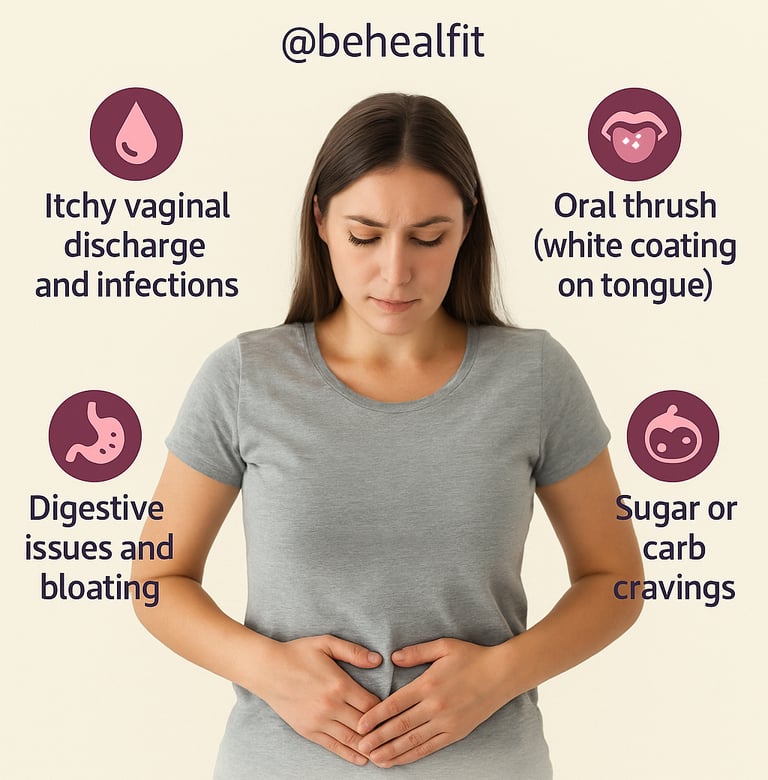Yeast and Fungal Overgrowth: What Every Woman Should Know
Learn how yeast and fungal overgrowth, including Candida, affect women’s health. Discover symptoms, causes, natural remedies, and prevention tips to restore balance and well-being.
HEALTHBLOG-LIST
8/21/20252 min read


In Brief
Yeast and fungal overgrowth, especially Candida, are common yet often misunderstood issues in women’s health. They can affect digestion, immunity, and even mood. While some yeast is normal in the body, an imbalance can cause persistent discomfort, recurrent infections, and fatigue. The good news? With the right approach — including diet, lifestyle, and targeted remedies — it’s possible to restore balance and prevent recurrence.
Table of Contents
What Is Yeast and Fungal Overgrowth?
Common Symptoms in Women
Main Causes of Candida Overgrowth
Natural Remedies and Lifestyle Support
Balanced Diet
Probiotics
Stress Reduction
Essential Oils
Limiting Sugar and Refined Carbs
FAQ
Conclusion
What Is Yeast and Fungal Overgrowth?
Yeast naturally lives in our gut, mouth, and vaginal flora. The most common type is Candida albicans. Normally, good bacteria keep it under control. But when the balance is disrupted, Candida can grow excessively, leading to infections and systemic issues.
Common Symptoms in Women
Recurring vaginal yeast infections
Bloating, gas, or digestive discomfort
Sugar cravings
Fatigue and brain fog
Skin rashes or nail fungus
Low immunity
Main Causes of Candida Overgrowth
Antibiotic use disrupting healthy gut flora
High sugar and processed food intake
Hormonal changes (pregnancy, birth control, menopause)
Chronic stress weakening the immune system
Weakened immunity from illness or poor lifestyle habits
Natural Remedies and Lifestyle Support
Balanced Diet
Focus on vegetables, lean proteins, whole grains, and healthy fats. Avoid refined sugar, alcohol, and processed foods.
👉 Read also: 9 Drinks That Boost Your Gut Health.
Probiotics
Restoring good bacteria with probiotics helps control yeast and supports digestion. Fermented foods like kefir, sauerkraut, and kimchi are excellent sources.
Stress Reduction
Chronic stress raises cortisol and weakens immunity. Incorporating mindfulness, yoga, or meditation can support balance.
Essential Oils
Some essential oils, such as tea tree or oregano oil (used safely and diluted), show antifungal properties in studies.
Limiting Sugar and Refined Carbs
Sugar feeds Candida. Cutting it down starves yeast and restores gut balance.
FAQ
1. Can yeast overgrowth cause fatigue?
Yes, Candida overgrowth is often linked to low energy and brain fog due to its impact on digestion and inflammation.
2. Are probiotics enough to fight Candida?
Probiotics help, but they should be combined with dietary changes for best results.
3. Can Candida overgrowth affect mental health?
Research suggests it can contribute to anxiety and mood swings due to gut-brain connection.
4. How do I know if I have Candida overgrowth?
A healthcare provider can run stool, blood, or vaginal swab tests to confirm.
5. Can men get Candida too?
Yes, although it is more common in women due to hormonal and vaginal flora factors.
Conclusion
Yeast and fungal overgrowth, especially Candida, can have a significant impact on women’s health. By understanding the causes, recognizing the symptoms, and adopting natural strategies like probiotics, stress reduction, and a low-sugar diet, you can restore balance and prevent recurrence.
💡 Action step: This week, try replacing sugary snacks with probiotic-rich foods like kefir or sauerkraut to support your gut balance.
Scientific Sources
Sobel JD. Vulvovaginal candidosis. Lancet. 2007.
Pappas PG et al. Clinical practice guidelines for the management of candidiasis. Clin Infect Dis. 2016.
Mason KL, et al. Candida albicans and the microbiota in health and disease. PLoS Pathog. 2012.
✍️ Written by Narcisse Bosso, certified naturopath. His lifelong passion for health became a profound calling after a loved one passed away from a natural illness that could have been prevented with simple lifestyle changes and habits.
